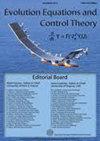非自治线性类抛物方程的镇定:斜投影与Riccati反馈
IF 1.2
4区 数学
Q1 MATHEMATICS
引用次数: 3
摘要
在文献中基于反馈的斜投影稳定性结果被扩展到更大的一类反应对流项。讨论了基于显式斜投影的反馈控制和基于Riccati的反馈控制之间的比较。讨论了每种反馈的优点和局限性以及它们的有限元实现。数值模拟结果比较了它们在时间周期动态情况下的稳定性能。给出了一种计算时间周期Riccati反馈的迭代算法的收敛速度估计。本文章由计算机程序翻译,如有差异,请以英文原文为准。
Stabilization of nonautonomous linear parabolic-like equations: Oblique projections versus Riccati feedbacks
An oblique projections based feedback stabilizability result in the literature is extended to a larger class of reaction-convection terms. A discussion is presented including a comparison between explicit oblique projections based feedback controls and Riccati based feedback controls. Advantages and limitations of each type of feedback are addressed as well as their finite-elements implementation. Results of numerical simulations are presented comparing their stabilizing performances for the case of time-periodic dynamics. Estimates are presented on the convergence rate of a proposed iterative algorithm to compute the time-periodic Riccati feedback.
求助全文
通过发布文献求助,成功后即可免费获取论文全文。
去求助
来源期刊

Evolution Equations and Control Theory
MATHEMATICS, APPLIED-MATHEMATICS
CiteScore
3.10
自引率
6.70%
发文量
5
期刊介绍:
EECT is primarily devoted to papers on analysis and control of infinite dimensional systems with emphasis on applications to PDE''s and FDEs. Topics include:
* Modeling of physical systems as infinite-dimensional processes
* Direct problems such as existence, regularity and well-posedness
* Stability, long-time behavior and associated dynamical attractors
* Indirect problems such as exact controllability, reachability theory and inverse problems
* Optimization - including shape optimization - optimal control, game theory and calculus of variations
* Well-posedness, stability and control of coupled systems with an interface. Free boundary problems and problems with moving interface(s)
* Applications of the theory to physics, chemistry, engineering, economics, medicine and biology
 求助内容:
求助内容: 应助结果提醒方式:
应助结果提醒方式:


